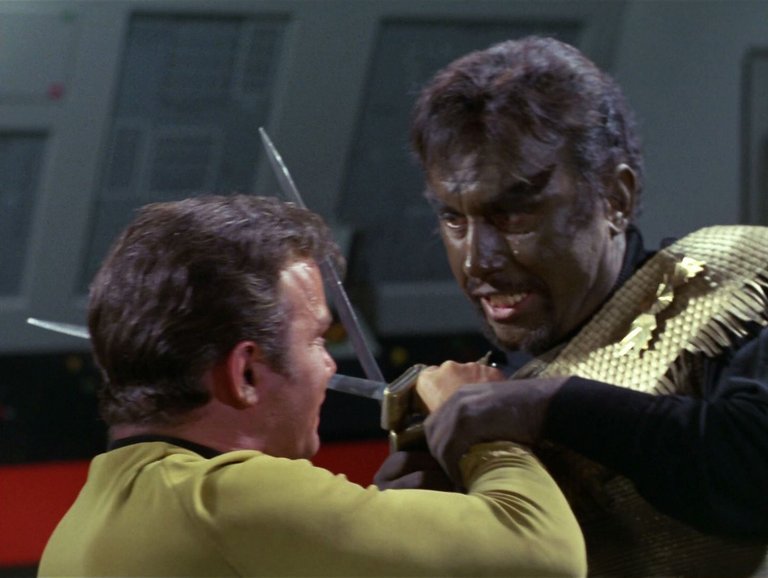Television Review: Day of the Dove (Star Trek, S3X11, 1968)

Day of the Dove (S03E11)
Airdate: November 1st 1968
Written by: Jerome Bixby
Directed by: Marvin Chomsky
Running Time: 50 minutes
Gene Roddenberry’s vision for Star Trek was never merely to entertain; it was a deliberate attempt to reimagine humanity’s trajectory in the shadow of the Cold War. At its core, the series sought to present a utopian future where ideological divides had been transcended, yet this optimism was tempered by the necessity of confronting contemporary anxieties through allegory. The Federation’s conflicts with the Romulans and Klingons were thinly veiled stand-ins for the Soviet-American rivalry, serving as cautionary tales about the perils of militarism and mutual distrust. Nowhere is this duality more explicit than in Day of the Dove, an episode that distills the existential dread of nuclear brinkmanship into a claustrophobic battle for control aboard the USS Enterprise. While the third season of The Original Series is often dismissed as creatively diminished by budgetary constraints, this episode stands out as a morally complex, if imperfect, meditation on the corrosive nature of hatred—and a testament to Star Trek’s enduring ability to mirror humanity’s darkest impulses.
The plot opens with the Enterprise responding to a distress signal from a Federation colony on Beta XII-A, a planet Kirk and his landing party - McCoy, Chekov, and security officer Johnson (David A, Ross) find eerily deserted. Instead of survivors, they encounter a contingent of Klingons led by Commander Kang (Michael Ansara), a grizzled warrior whose ship, he claims, was destroyed by Federation aggression. Kang’s capture of Kirk—thwarted only by a coded message that leads to the Klingons’ imprisonment aboard the Enterprise—sets in motion a spiraling crisis. The ship is seized by an unseen force that traps most of the crew in lower decks, manipulates the remaining personnel into violent conflict, and propels the Enterprise to the galaxy’s edge. As tensions between the stranded Starfleet officers and Klingons escalate into bloodshed, Spock deduces that the entity—a non-corporeal being sustained by hatred—is orchestrating the chaos. To survive, Kirk must broker a fragile truce with Kang, forcing both sides to confront their complicity in the cycle of vengeance.
Written by Jerome Bixby, a science fiction writer renowned for his work on The Twilight Zone and previous episodes of The Original Series, Day of the Dove leverages its premise as a stark allegory for the 1960s geopolitical landscape. The episode’s title—a reference to a dove as symbol of peace—serves as a metaphor for the existential threat posed by irrational hostility. Just as the United States and Soviet Union were bound to a single planet, compelled to coexist despite their ideological chasm, the Federation and Klingons must share a single starship where mutual annihilation is the only alternative to cooperation. Bixby’s script excels in illustrating how conflict is perpetuated not merely by tangible grievances, but by the manipulation of trauma and myth. Chekov’s delusion of a brother killed by Klingons—a fabrication implanted by the entity—epitomizes how collective memory can be weaponised to justify violence. The episode’s most harrowing scene, in which a possessed Chekov attempts to rape Mara (Susan Howard), Kang’s wife, underscores the dehumanizing consequences of such manipulation. It is a jarring, almost exploitative moment, yet one that lays bare the brutality latent within unchecked aggression.
For all its conceptual brilliance, the episode stumbles in execution. The constraints of Season 3’s shoestring budget are glaringly evident: the Klingons’ rubbery prosthetics and the entity’s underwhelming visual effects undercut the tension. Worse still, the decision to reveal the entity’s influence prematurely diminishes its menace. By attributing the chaos to an external force so early, the narrative sacrifices the opportunity to explore how human (or Klingon) nature might independently spiral into self-destruction. The entity’s role, while thematically coherent, risks simplifying the moral quandary into a deus ex machina rather than a systemic failure of empathy. A slower unveiling—allowing the crew’s paranoia to fester unexplained—might have amplified the horror of their voluntary descent into barbarism.
Yet these flaws are mitigated by Marvin Chomsky’s taut direction and a suite of powerhouse performances. Chomsky, best known for his work on Roots, brings a documentary-like intensity to the cramped corridors of the Enterprise, heightening the sense of entrapment. The regular cast rises to the occasion, with Shatner’s Kirk balancing tactical cunning and moral resolve, while Nimoy’s Spock delivers his characteristic blend of logic and dry wit. Michael Ansara, stepping into the role of Kang after John Colicos’ unavailability as character of Kor introduced in Errand of Mercy, imbues the Klingon commander with a Shakespearean gravitas. His portrayal of a warrior bound by honour yet tormented by the entity’s manipulations elevates the character beyond a one-dimensional antagonist. Ansara’s performance was so indelible that it earned him repeat roles in Deep Space Nine and Voyager, cementing Kang as a cornerstone of Klingon lore.
Crucially, Day of the Dove marks a watershed in Star Trek’s world-building by introducing the franchise’s first female Klingon. Mara is no mere ornament; she is a scientist and Kang’s equal, challenging the notion that Klingon society is an exclusively patriarchal war machine. Her presence—though limited by the episode’s runtime—hints at a more nuanced culture beneath the warriors’ posturing, a concept fleshed out in later series. This single detail, revolutionary for 1968, underscores Roddenberry’s commitment to progressive ideals even amid the episode’s darker themes.
Ultimately, Day of the Dove is as a flawed but fearless experiment in science fiction storytelling. Its allegory is unflinching, its performances electrifying, and its moral inquiry as urgent now as during the Cold War. It reminds viewers that peace is not the absence of conflict, but the conscious rejection of the hatred that fuels it—a lesson as precarious and necessary as the truce Kirk forges in the void.
RATING: 7/10 (+++)
Blog in Croatian https://draxblog.com
Blog in English https://draxreview.wordpress.com/
InLeo blog https://inleo.io/@drax.leo
LeoDex: https://leodex.io/?ref=drax
InLeo: https://inleo.io/signup?referral=drax.leo
Hiveonboard: https://hiveonboard.com?ref=drax
Rising Star game: https://www.risingstargame.com?referrer=drax
1Inch: https://1inch.exchange/#/r/0x83823d8CCB74F828148258BB4457642124b1328e
BTC donations: 1EWxiMiP6iiG9rger3NuUSd6HByaxQWafG
ETH donations: 0xB305F144323b99e6f8b1d66f5D7DE78B498C32A7
BCH donations: qpvxw0jax79lhmvlgcldkzpqanf03r9cjv8y6gtmk9